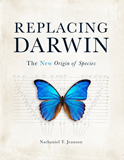
“One year of Replacing Darwin: What have we learned?”
In October of 2017, I published Replacing Darwin, a book that answered decades-old criticism of creation science and held the potential to transform the origins debate. This October marks the one-year anniversary of this event. Have the beginnings of a revolution been realized?
Background
Forty years ago, the creation/evolution debates underwent a significant shift. Prior to the 1980s, evolutionary scientists were caught off guard by the pioneering findings of creationists like Dr. Henry Morris and Dr. Duane Gish. The latter were skilled debaters, and they presented a strong, difficult-to-refute case against the validity of Darwinian evolution. Creation scientists were so successful that states began mandating the teaching of creation science alongside evolution in public school curricula. Around 1980, evolutionists regrouped and fought back.
The post-1980 evolutionary strategy revolved around a common theme: The gold standard for science. Evolutionists insisted that the Morris-Gish strategy of attacking evolution was not enough. To be considered scientific, evolutionists demanded that creation scientists publish ideas that could be evaluated and tested in the laboratory or in the field. In other words, evolutionists asserted that creation science could not be considered scientific unless it could be falsified, at least in theory. The criterion of falsifiability is the gold standard of science—and the dominant theme in the last 40 years of the origins debate.
In October of 2017, I published numerous falsifiable predictions in Replacing Darwin. In light of this fact, the stage has been set for a new era in this conflict. As such, the arena has now shifted to the future. The main means by which evolution and creation can be compared side by side is by watching how experiments play out over time—and observing which experiments confirm or reject the predictions of either side.
How have the last 12 months treated the predictions in Replacing Darwin?
Twelve Months of Scientific Discoveries
In Replacing Darwin, I made predictions in four major biological realms. First, in Chapter 6 (“A Stich in Time”), I made predictions on the rates at which species form. In other words, since creation scientists believe that God created kinds, not species, in Genesis 1, creationists hold that new species can form within kinds (while also maintaining that one kind cannot naturally transform into another kind). Conversely, since creationists believe that kinds are only a few thousand years old, they believe that many species have formed in a few thousand years. This is in stark contrast to the evolutionary claim that species evolve slowly over millions of years. Consequently, creationists and evolutionists make strikingly different predictions on the rates at which species form.
Second, in Chapter 7 (“Turning the (time)Tables”), I made predictions about the rates at which mutations (mistakes that happen during the process of copying DNA) occur in various species. Again, because creationists believe that life is only a few thousand years old, whereas evolutionists believe that it is hundreds of millions of years old, these two ideas differ sharply on their predictions about the rates of DNA change.
Third, in Chapter 8 (“A Preexisting Answer”), I made predictions about the function of DNA differences. Not surprisingly, creationists believe that many DNA differences were placed in the kinds by God at the beginning. Creationists predict that these created differences are functional. Evolutionists forbid any such ideas from their scientific models, and, instead, explain all DNA differences as ultimately the result of mutations. Consequently, they think many of these mutation-derived DNA differences serve no purpose.
Fourth, in Chapter 10 (“On the Origin of New Species”), I explored another facet of DNA change. The details are technical and beyond the scope of this article, but they represent yet another testable aspect of my claims.
How have the last 12 months treated these predictions?
With respect to the rates at which species form, creation science couldn’t have asked for a bigger bombshell this past January. For years, Darwin’s finches on the Galápagos Islands have been textbook icons of “evolution in action.” Recent observations in these finches have revealed that they are forming new species very quickly—at a rate exactly in line with what Replacing Darwin predicted. Furthermore, the mechanism by which they are forming accords very well with the genetic predictions I made in Replacing Darwin. Will these birds soon become the icon of creation?
With respect to the rates of DNA mutation, studies by evolutionists once again hinted at the veracity of the claims in Replacing Darwin. In May, a pair of evolutionists announced that low levels of genetic differences within species suggest that they originated recently. When combined with the data I published in Replacing Darwin, I took the authors’ data to its logical conclusion: “In other words, these…results suggest that, in general, the predictions I made for mtDNA [mitochondrial DNA—a subset of our total DNA] mutation rates in diverse species are likely to be fulfilled.”
With respect to DNA function, space does not permit me to document the rapidly accumulating evidence for pervasive DNA function. In Replacing Darwin, I pointed out that, at the time of publication in 2017, a trajectory of high levels of DNA function had been set. This trajectory appears to be following its expected course.
Twelve Months of Criticism
What have these scientific successes done to convince the opponents of creation science? Upon the book’s release, we sent copies to leading evolutionists like PZ Myers and Jerry Coyne, with invitations to critique the book’s contents. To date, these recipients have declined to engage Replacing Darwin.
However, in April, a Danish PhD biologist, Stefan Frello, offered his own critique of Replacing Darwin, and we published it in the Answers Research Journal. Nevertheless, as you can see in my published response, Frello failed to engage the major points of the book. Furthermore, where he attempted to criticize the science, he either severely misrepresented the book, or, in some cases, ended up inadvertently bolstering my original claims.
More recently, at the beginning of September, I participated in an online video debate with Dr. Herman Mays, an evolutionary biologist at Marshall University. While the original purpose of the debate was to review Replacing Darwin live and on air, Mays’ main arguments were straw men of my book. In fact, some of his arguments betrayed a profound unfamiliarity with large sections of the book.
Each of these three attempts at inviting critique revealed a pattern that I’ve previously documented. On one hand, 97% of the scientific community currently rejects the conclusions I reach in Replacing Darwin. On the other hand, the vast majority of the scientific community appears to be completely unfamiliar with the hypotheses and claims that creationists make—they don’t seem to carefully read our literature. The events of the past year have further underscored this observation.
Twelve months have elapsed, and the conclusions of Replacing Darwin have been strengthened, not weakened.
Looking to the Future
Consider what we’ve just witnessed: Twelve months have elapsed, and the conclusions of Replacing Darwin have been strengthened, not weakened—despite active attempts to invite harsh criticism. Could this be harbinger of things to come?
Looking ahead, two collaborators and I are in the midst of exploring whether the history of civilization over the past 2,500 years has left its stamp in our DNA. Since evolutionists think the history of the modern human species stretches back over hundreds of thousands of years, they tend not to even look for such a signature. In fact, if evolution were true, you probably wouldn’t expect to find one. The initial results of our study suggest that such a signature exists.
In other words, one year after the publication of Replacing Darwin, the future is looking bright.
Recommended Resources

Answers in Genesis is an apologetics ministry, dedicated to helping Christians defend their faith and proclaim the good news of Jesus Christ.
- Customer Service 800.778.3390
- © 2024 Answers in Genesis






